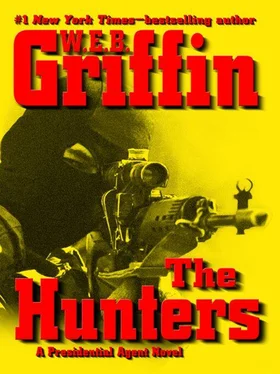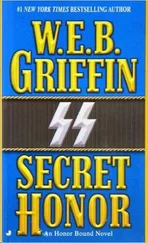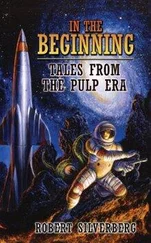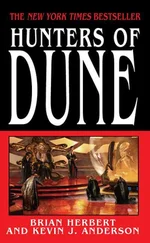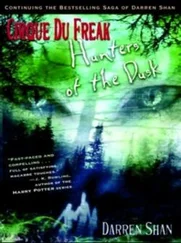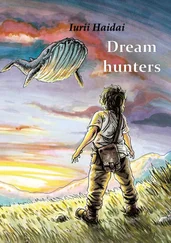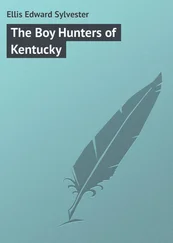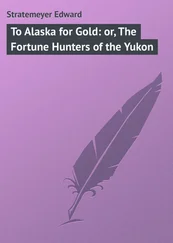W Griffin - Hunters
Здесь есть возможность читать онлайн «W Griffin - Hunters» весь текст электронной книги совершенно бесплатно (целиком полную версию без сокращений). В некоторых случаях можно слушать аудио, скачать через торрент в формате fb2 и присутствует краткое содержание. Жанр: Триллер, на английском языке. Описание произведения, (предисловие) а так же отзывы посетителей доступны на портале библиотеки ЛибКат.
- Название:Hunters
- Автор:
- Жанр:
- Год:неизвестен
- ISBN:нет данных
- Рейтинг книги:5 / 5. Голосов: 1
-
Избранное:Добавить в избранное
- Отзывы:
-
Ваша оценка:
- 100
- 1
- 2
- 3
- 4
- 5
Hunters: краткое содержание, описание и аннотация
Предлагаем к чтению аннотацию, описание, краткое содержание или предисловие (зависит от того, что написал сам автор книги «Hunters»). Если вы не нашли необходимую информацию о книге — напишите в комментариях, мы постараемся отыскать её.
Hunters — читать онлайн бесплатно полную книгу (весь текст) целиком
Ниже представлен текст книги, разбитый по страницам. Система сохранения места последней прочитанной страницы, позволяет с удобством читать онлайн бесплатно книгу «Hunters», без необходимости каждый раз заново искать на чём Вы остановились. Поставьте закладку, и сможете в любой момент перейти на страницу, на которой закончили чтение.
Интервал:
Закладка:
The body lying on its back behind a large, ornate desk and next to the open door of a safe was that of a some what squat, very black man in his late forties. There were two entrance wounds in the face, one on the right side of the forehead, the second on the upper lip.
A section of the skull had been blown outward. There was brain tissue on the safe and on the wall beside it.
Artigas sensed Ordonez's eyes on him.
"Two entrance wounds that close," Artigas said, "maybe a submachine gun?"
Ordonez nodded.
"But from a distance," he said, pointing to the window. One of the panes was broken. "If he had been shot in here, for example, the moment he obligingly opened the safe, I think there would have been powder burns on the face."
"Yeah," Artigas said.
"The photo album?" Ordonez asked.
"On the desk, Chief Inspector," the police supervisor said.
"While Captain Cavallero was leaving everything exactly as it was when he first came here," Ordonez said, drily, "he happened to notice and then scan through a photo album. I think you may find it interesting."
The Moroccan leather-bound photo album on the desk was open to an eight-by-ten-inch color photograph of a wedding party standing on the steps of a church large enough to be a cathedral. Everyone was in formal morning clothing. Senor Bertrand was standing at the extreme right. The bride, a tall, slim woman, was standing beside an extraordinarily tall, broadly smiling young man.
"Julio," Ordonez asked, softly, "do you think the bridegroom is who Captain Cavallero thought it might be?"
Well, Artigas thought, now I know why I'm here.
"That's Jack the Stack, all right. No question about it," he said.
"'Jack the Stack'?"
"Before he was J. Winslow Masterson of the United States State Department, he was Jack the Stack of the Boston Celtics," Artigas said.
"Really? A professional basketball player? I didn't know that. From the Celtics to the State Department?"
"He got himself run over by a beer truck as he was leaving a stadium," Artigas said. "No more pro ball. And the settlement-the truck driver had been sampling his wares-made Jack the Stack a very wealthy man. I heard sixty million dollars."
"Now that I think about it, I remember hearing that story. But I didn't connect it with an American diplomat in Buenos Aires," Ordonez said and then asked, "I wonder what Senor Bertrand's relationship to Senor Masterson was?"
"That's not all I'm wondering about Senor Bertrand," Artigas replied. [THREE] Office of the Ambassador The Embassy of the United States of America Lauro Muller 1776 Montevideo, Republica Oriental del Uruguay 2035 2 August 2005 The Honorable Michael A. McGrory, minister extraordinary and plenipotentiary of the President of the United States to the Republic of Uruguay, was a small, wiry well-tailored man of fifty-five with a full head of curly gray hair. He was held in varying degrees of contempt by many members of the "embassy team," the very ones who referred to him-behind his back, of course-as "SenorPompous."
This was especially true of those members of the embassy team who were not members of the Foreign Service of the United States. These included the twenty-one employees of the Justice Department assigned to the Montevideo embassy. Fourteen of them carried the job description of "Assistant Legal Attache," although they were in fact special agents of the Federal Bureau of Investigation. The other seven were special agents of the Drug Enforcement Administration.
There were others-the CIA station chief, for example, representatives of the Federal Aviation Agency, the Department of Homeland Security, and even employees of the Department of Agriculture-assigned to the embassy. The latter were charged with ensuring that Uruguayan foodstuffs exported to the United States-primarily, meat and dairy products-met the high standards of purity established by the U.S. government.
Although all of these specialists enjoyed diplomatic status, they were not really diplomats-and this was often pointed out to them in varying degrees of subtlety by SenorPompous.
All the specialists would, after several years, return to the States and whatever governmental agency had, so to speak, loaned them to the Department of State.
The Foreign Service people, on the other hand, regarded themselves as professionals trained in the fine art of diplomacy who could look forward to other foreign assignments after Uruguay and to increasingly senior positions within the Department of State. Presuming, of course, that the hired hands from the Justice Department or the FAA or-especially-the CIA didn't do something violating the rules of diplomatic behavior that would embarrass the embassy and the Foreign Service personnel who were supposed to keep the hired hands under control.
Ambassador McGrory, for example, had begun his Foreign Service career as a consular officer in Nicaragua. As he over the years had moved from one United States embassy to another in South America, he had risen-some what slowly but steadily-upward in the State Department hierarchy. He had been a commercial attache in Peru, a cultural attache in Brazil, and, before his appointment as ambassador to Uruguay, he had been deputy chief of mission in Asuncion, Paraguay.
With the exception of the Agriculture Department people-who did their job, kept him abreast of what was going on, and stayed out of trouble-Ambassador McGrory had trouble with just about everyone else who was not a bonafide diplomat.
There were several reasons for this, and, in Ambassador McGrory's opinion, the most significant was their inability to understand that they were in fact answerable to him. The regulations were clear on that. As the senior official of the United States government in Uruguay, all employees and officers of the United States were subject to his orders.
Many-perhaps most-of the problems caused were by the DEA agents, whom McGrory privately thought of as hooligans. They often went around "undercover," which meant that not only were they unshaven and unshorn but dressed like Uruguayan drug addicts. And under their shabby clothing they carried a variety of weaponry. It was only a matter of time, in McGrory's professional opinion, before they shot some Uruguayan and he would have to deal with all the ramifications.
He had issued an order a year before that required that the DEA agents go armed only when necessary. When it became apparent that the DEA agents considered it was necessary all the time, he had modified the order so that they would have to have his permission before arming themselves on any specific occasion. That order had been in effect fewer than seventy-two hours when the assistant secretary of state for Latin America had telephoned him to politely but firmly order him to refrain from interfering with the DEA agents' rights to defend themselves.
The FBI agents were far better dressed than those of the DEA but, if anything, less willing to keep him abreast of what they were doing and when. Their primary function was the detection of money laundering. Uruguay was known as the South American capital of money laundering. McGrory was naturally interested to know what they were doing, but they rarely told him any specifics.
And half of them, at least, also went about armed to the teeth.
Ambassador McGrory was thus concerned when the senior of the FBI agents, a man named James D. Monahan, telephoned him as he was about to leave the embassy and requested an immediate audience.
"Will this wait until the morning, Monahan?"
"Sir, I really think you should hear this now."
"Very well," the ambassador replied. "You may come up."
Monahan and Julio Artigas arrived at McGrory's office three minutes later. The ambassador did not offer them chairs.
"Artigas has run into something I thought should be brought to your attention as quickly as possible, Mr. Ambassador," Legal Attache James D. Monahan said, politely.
Читать дальшеИнтервал:
Закладка:
Похожие книги на «Hunters»
Представляем Вашему вниманию похожие книги на «Hunters» списком для выбора. Мы отобрали схожую по названию и смыслу литературу в надежде предоставить читателям больше вариантов отыскать новые, интересные, ещё непрочитанные произведения.
Обсуждение, отзывы о книге «Hunters» и просто собственные мнения читателей. Оставьте ваши комментарии, напишите, что Вы думаете о произведении, его смысле или главных героях. Укажите что конкретно понравилось, а что нет, и почему Вы так считаете.
